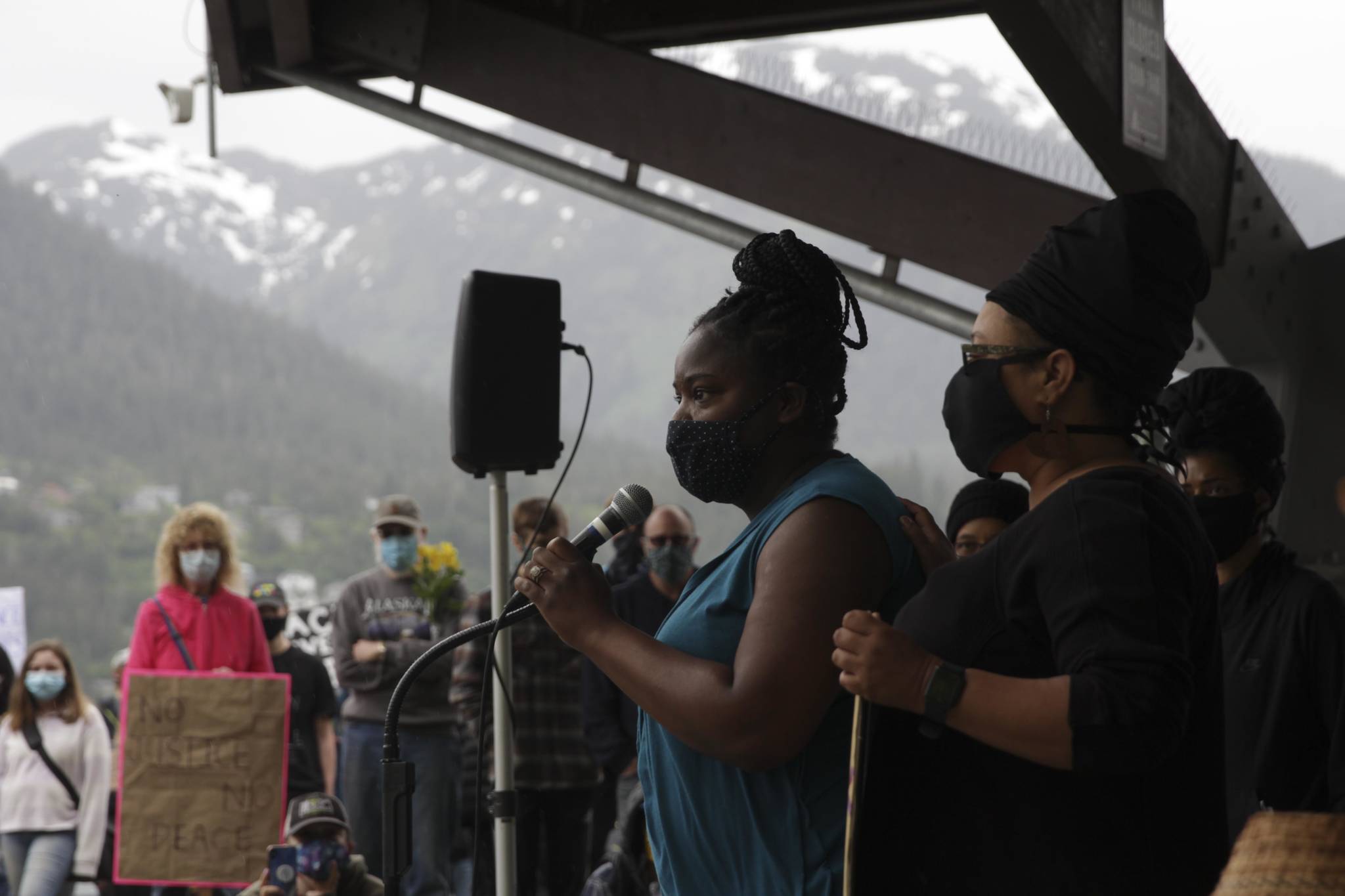Masses gathered at Marine Park Saturday afternoon for a vocal rally defending the sanctity of life for black Americans.
“We asked you to come here and hear us today,” said a speaker at the rally, who declined to be identified. “Enough is enough.”
The peaceful rally gathered a masked and distanced crowd of hundreds who called and responded to chants for justice and change.
“I stand here today because racism has got to go,” said another speaker, who also declined to be identified. “I stand here today to continue the fight of my ancestors.”
The rally follows hundreds of demonstrations in the Lower 48 following the death of George Floyd in police custody.
“At what age do we explain to our children some people will hate them because they’re black?” said another speaker, who also declined to be identified. “Stop robbing our children of their innocence.”
Speakers called for improvements to Juneau’s police, school and municipal policy. Changes they espoused include a police oversight committee, demilitarization of the Juneau Police Department, dismissal of officers not using body cameras or charged with domestic assault offenses, upgraded education of police and correctional officers on race and human rights issues, release of records concerning murdered and missing indigenous women and safe places and oversight committees in schools to push back against racist behavior.
“Just because my skin is black doesn’t make me less of a human,” said another speaker.
Demonstrators rallied at the park for roughly an hour before marching to the Douglas Bridge to drop commonly carried flowers into the water.
[Nation’s hurt is felt at home, say black and indigenous leaders]
Virtual rally calls for real change
The speakers may have been divided into separate digital squares, but a virtual rally held Saturday emphatically underscored the shared experiences of marginalized communities.
A virtual rally hosted by Central Council of Tlingit and Haida Indian Tribes of Alaska drew thousands to see and hear an international panel that included black, Native and LGBTQ representation discuss common struggles and mutually beneficial advocacy.
“We’ve been divided, but we’re actually in this fight together,” said Angola Dixon, who described herself as a “panther cub” whose father and uncle had been leaders of the Seattle chapter of the Black Panther Party. “Any time that I hear about an indigenous woman, a Native, First Nations woman, who disappeared, who was murdered and no one said anything, I feel that pain. It’s our pain, it’s not your pain. It’s our pain. So we want you to feel this pain, too. We want you to stand with us, to march with us, but it has to be sustained.”
Artist, attorney and community organizer Nikkita Oliver, similarly said black and Native liberation are intertwined. Oliver, who has called for the defunding of Seattle police and for the funds to be used for community-based health and safety, said such investment would benefit both Native and black communities.
Tlingit & Haida President Richard Chalyee Éesh Peterson also spoke to the similar but distinct experiences of Native, black and LGBTQ people.
Peterson said it would be wrong not to condemn what he called the “brutal murder” of George Floyd, a black man who died May 25 in police custody after a police officer pressed his knee into Floyd’s neck for nearly nine minutes.
Four officers now face charges in connection to Floyd’s death, and there have now been rallies and protests in all 50 states as well as overseas.
“It would be wrong if we didn’t put a voice to our feelings. It would be wrong if we didn’t say they matter,” Peterson said. “Black lives matter.”
He also acknowledged that June is Pride Month as well as the history made by the Stonewall Uprising, the advocacy work of Marsha P. Johnson and the lives lost during the 2016 Orlando nightclub shooting.
Duane Aucoin, a gay man and executive council member for Teslin Tlingit Council said he was heartened by the inclusivity and said homophobia —or hate of any kind —is not the Tlingit way.
During the panel discussion, the sometimes-polarizing nature of the phrase “black lives matter,” which is countered by some with the phrase “all lives matter” was discussed. Panelists, including Aucoin, said they did not interpret the specificity of the phrase “black lives matter” to be exclusionary.
“I know you’re not saying only black lives matter,” Aucoin said. “The reason we’re saying black lives matter is because society says black lives don’t matter.”
Miciana Hutcherson, who is both black and Tlingit, said in her experience, that understanding is not universal. Hutcherson said over the past week she’s seen anti-black sentiment shared by friends, family and community leaders.
However, Hutcherson said in her 10 years living in Seattle, any rally for an indigenous cause she has attended has been supported respectfully by the Black Lives Matter contingent.
She said she hopes the Native community will choose this time to show similar support.
“We need you guys to show up the way you showed up for Standing Rock,” Hutcherson said. “We need you to show up the way Tlingits and Haidas show up for each other. This affects all of us, and I promise you the folks shouting black lives matter know unequivocally that Native lives matter as well.”
“I promise you we are trying to lift you up with us, but we can’t do it if we’re dead,” she continued. “I just thought it was important to share that with you folks so maybe, just maybe we can change the system that is affecting us all.”

